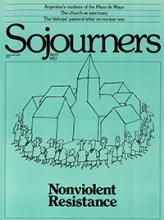It was midnight. Before retiring I walked out on the screened porch where my 15-year-old son was sleeping. I was leading a team of 17 young people, including two of my own children, on a three-month work assignment in a jungle area 200 miles from the nearest city in a South American country. Four years before, my husband and I with our four children had first come to this area at the request of the village people to help them start a church, build a fish hatchery, and develop other forms of appropriate technology to meet basic human needs. After the church and appropriate technology center had been established we moved to work in another country. This summer the village had asked us to return to experiment with a vegetable protein project.
When we received the invitation, my husband was already committed to a project in Haiti for the summer. We decided to divide up for three months in order to work in both projects. My husband took our 14-year-old Karen with him to Haiti while our 15-year-old Tommy and 16-year-old Kathy went with me, leaving our 19-year-old Chris to take care of things at our headquarters in Alabama.
The air on the porch was chilly, so I laid a blanket across Tommy's cot, then stood a moment looking out across the fishponds that were bringing hope for more food to our village. The light from the moon made a rippling path of white across the water.
Suddenly I heard a crash. Turning quickly I could see in the moonlight that a soldier had slid into our water barrel. I was paralyzed with shock as I looked out over the clearing that separated our temporary home from the jungle. About 30 soldiers were rushing our house.
Read the Full Article

